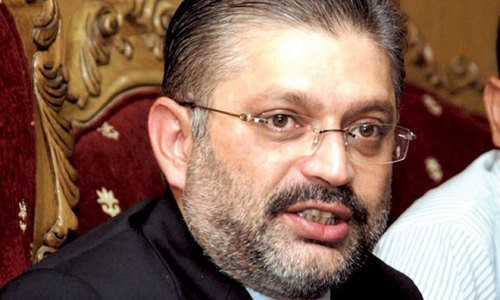An accountability court in Karachi on Thursday indicted Sharjeel Memon and 11 others in a corruption case pertaining to the award of advertisements at 'exorbitant rates' through the abuse of power.
The hearing was held in a sealed courtroom, where no media and non-essential personnel were allowed. All the men indicted in the case pleaded not guilty to charges of corruption.
Four of the indicted men — Asim Sikandar, Riaz Muneer, Inam Akbar and Muhammad Hanif — in an application, raised questions on the indictment.
The four men said that the documents that should have been provided to them under the law have not been handed to them.
The hearing was adjourned until March 3, when the court will start hearing witness testimonies in the case.
A team from NAB had taken Memon and his accomplices into custody on Oct 23, 2017 after the Sindh High Court had rejected his bail plea in a corruption case.
Following the rejection of his bail plea, Memon had holed up for hours in a courtroom to avoid arrest as his team explored their options, but could not stave off the inevitable for long.
In a previous hearing of the case, NAB had said that it investigated corruption and corrupt practices in the award of advertisements against the law and at exorbitant rates to TV channels and FM radio stations for various awareness campaigns between July 2013 and June 2015. It had found that the accused acted with the connivance of each other, resulting in losses to the national exchequer.
The PPP leader is also facing a separate reference regarding illegal adjustment and consolidation of hundreds of acres of land in favour of a private housing project.
On Nov 25, 2017 the PPP leader had filed an appeal in the apex court, challenging the SHC's decision to reject his bail in a reference pertaining to the award of advertisements at 'exorbitant rates' through the abuse of his power.
In his appeal, Memon had said that he should be granted bail since NAB does not have any evidence against him, adding that his arrest was in contradiction with accountability laws.
The appeal for relief was rejected by the Supreme Court on January 2.














































